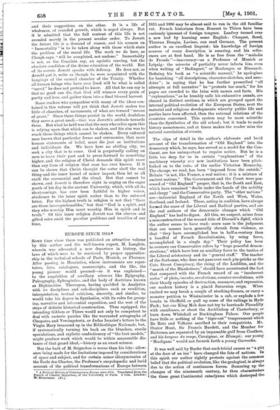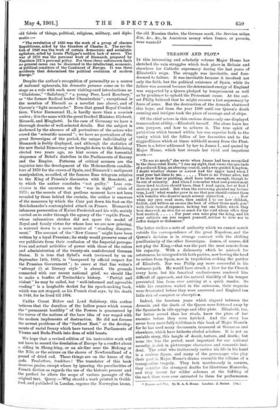EUROPE SINCE 1814.* SOME time since there was published an
attractive volume by this author and the well-known expert, M. Langlois, wherein was advocated a new departure in history, the laws of which were to be mastered by proper apprentice- ship in the technical schools of Paris, Munich, or Florence. After passing in Heuristics, whose instruments are reper- toires, lists, catalogues, manuscripts, and the like, the young pioneer would proceed—so it was explained— to the acquisition of auxiliary sciences like Epigraphy, Paleography, Sphragistics, and the body of doctrines known as Diplomatics. Thereupon, having qualified in Analytics with its disciplines and sub-disciplines such as erudition, interpretation, textual criticism, sincerity, and similar, he would take his degree in Synthetics, with its rules for group- ing, narrative and inferential exposition, and the rest of the steps of definite historical construction. Thus equipped, the intending Gibbon or Thiers would not only be competent to deal with esoteric puzzles like the warranted autographs of Cleopatra and Vercingetorix, or Judas Iscariot's letters to the Virgin Mary treasured up in the Bibliotheque Nationale, but, if systematically turning his back on the blunders, sterile speculations, and stylistic confectionery of " the best models," might produce work which would be within measurable dis- tance of that grand ideal,—history as an exact science.
But the bark of M. Seignobos is worse than his bite : allow- ance being made for the limitations imposed by considerations of space and subject, and for certain minor idiosyncrasies of the lcole des Chartes, the Professor's encyclopedic and lucid account of the political transformations of Europe between
• A Political History of Contemporary Europe since 1814. Translated from the ',tench of Charles Seignobos, of the University of Paris. 2 vols. London : W. Heinemann. [21.)
1815 and 1896 may be almost said to run in the old familiar rut. French historians from Bossuet to Thiers have been curiously ignorant of foreign tongues. Lanfrey turned over a new leaf by learning some English : Cloquet, Sorel, Thureau Dangin, Lavisse, can read German. The present author is an excellent linguist : his knowledge of foreign sources of every description is amazing, and his refer- ences are at first hand. He is as free from the " maladie de Froude "—inaccuracy--as a Professor of Munich or Leipzig: the microbe of partiality never infects him, even when writing of " Badinguet," or Boulanger, or Bismarck. Defining his book as "a scientific manual," he apologises for banishing "all descriptions, character-sketches, and anec- dotes"; in saying that he has further proscribed "all attempts at full narrative" he "protests too much," for his pages are crowded to the brim with names and facts. His "explanations," as he humbly calls his exhaustive annals, are classed in distinct sections, in which are grouped apart the internal political evolution of the European States, next the material and religious developments whereby public life and parties have been affected, then the external relations of the countries concerned. This system may be more scientific than the Synthetics of the old school ; but it tends to make history monotonous, and at times makes the reader miss the natural correlation of events.
The slips of detail in the author's elaborate and lucid account of the transformation of "Old England" into the democracy which, he says, has served as a model for the Con- tinent, are too unimportant to require notice. But he is a little too deep for us in certain " explanations " of the machinery whereby 431:r new institutions have been pitch- forked on to the ruin.: of the earlier Victorian Monarchy. The change, we read, has been "imposed from the outside." Britain " is not, like France, a real nation : it is a mixture of ancient nations." The Government and the Court were pos- sessed of "Old England" proper, that is, the South and East, which have remained " docile under the hands of the nobility and clergy " and the Conservative party. The " other nations " are—industrial England of the North and West, Wales, Scotland, and Ireland. These, acting in coalition, have always formed the mass of the Liberal and Radical parties, and are the real authors of the democratic changes which Old England" has had to digest. All this, we suspect, arises from a misconstruction of the second title of Disraeli's Sybil, which the author seems to have read: more sane is the judgment that our masses have. generally shrunk from violence, so. that they have accomplished less in half-a-century than a handful of French Revolutionists, by using force, accomplished in a single day." Their policy has been to overawe our Conservative rulers by "huge peaceful demon- strations," which have lent an auxiliary force to the tactics of the Liberal aristocracy and its " general staff." The teacher of the Sorbonne, who does not pass over such pin-pricks as the Cato Street Conspiracy, the rising of the Luddites, and the "march of the Blanketeers," should have accentuated the fact that compared with the French record of an " incoherent series " of plots, gmeutes, revolutions, counter-revolutions, with their bloody episodes of destruction, massacre, and repression, our modern history is a placid Saturnian reign. When excited we may break a couple of stocking-frames, or carry a monster petition to Westminster in a cab, or explode a few bombs in Sheffield, or pull up some of the railings in Hyde Park ; but our King Mob does not try to barricade Piccadilly with omnibuses, or shoot the Archbishop of Canterbury, or burn down Whitehall or Buckingham Palace. Our people have little or nothing of the " tiger-cat" temperament which De Retz and Voltaire ascribed to their compatriots. Mr. Orator Hunt, Sir Francis Burdett, and the Member for Battersea are separated by an impassable gulf from Couthon, and his broyons du rouge, Cavaignac, or Illanqui ; our young " Hooligans " would not furnish forth a young Gavroche.
It was well said by Burke that such trivial causes as "a girl at the door of an inn" have changed the fate of nations. In this spirit our author rightly protests against the common belief that the political evolution, like the geological, is always due to the action of continuous forces. Summing up the changes of the nineteenth century, he thus characterises the three great Continental cataclysms which destroyed the old fabric of things, political, religious, military, and diplo- matic :—
"The revolution of 1830 was the work of a group of obscure Republicans, aided by the blunders of Charles X. The revolu- tion of 1848 was the work of certain democratic and socialistic agitators, aided by Louis Philippe's sudden lack of nerve. The war of 1870 was the personal work of Bismarck, prepared by Napoleon LII.'s personal policy. For these three unforeseen facts no general cause can be discerned in the intellectual, economic, or political condition of the Continent of Europe. It was three accidents that determined the political evolution of modern Europe."
Despite the author's recognition of personality as a source
of national upheavals, his dramatis persona come on to the stage as a rule with such mere visiting-card introductions as " Gladstone," " Salisbury," " a young Peer, Lord Rosebery," or "the former Radical leader Chamberlain" ; exceptional is the mention of Disraeli as a novelist (see above), and of Cavour's "light moustache." Even that grand Royal Condot- tiere, Victor Emmanuel II., is hardly more than a nominis umbra ; it is the same with the great frocked Minister, Gioberti, Ricaaoli, and Minghetti. In the case of Germany we have a
thorough douche of well-selected details. But the subject is darkened by the absence of all portraiture of the actors who crowd the "scientific manual " ; we have no portraiture of the great Sovereigns of the period, the unique individuality of Bismarck is feebly displayed, and although the statistics of the new Social Democracy are brought down to the Reichstag elected two years ago, no hint occurs of the torrential eloquence of Bebel's diatribes in the Parliaments of Saxony and the Empire. Patterns of critical acumen are the inquiries into the development of the Hohenzollern candida- ture of 1870 for the crown of Spain, and Bismarck's malignant manipulation, so-called, of the famous Ems telegram relative to the King of Prussia's discussion with M. Benedetti, as to which the author concludes "not guilty." Less con- clusive is the excursus on the " war in sight" crisis of 1875 ; as the secrets of that perilous moment have not been revealed by those behind the curtain, the author is unaware of the measures by which the Czar put down his foot on the Reichskanzler's contemplated attack on France. Bismarck's infamous persecution of Kaiser Frederick and his wife, mainly carried on to order through the agency of the " reptile Press," whose calumnious strokes did not spare the model of Royal and family virtue for whose loss we are now grieving, is watered down to a mere matter of " standing disagree- ment." The account of the "New Course " might have been written by a loyal Prussian; its study would preserve some of our publicists from their confusion of the Imperial preroga- tives and actual activities of power with those of the rulers and administration of the twenty-six confederated German States. It is true that Sybel's work (reviewed by us on
September 14th, 1895), is "hampered by official respect for the Prussian Government " ; to sneer at that fine writer's "attempt (!) at literary style " is absurd. On grounds
connected with our recent national grief, we should like to make a bonfire of Treitschke's history. "Partial and violent" he may be called, but "well-informed and agreeable
reading " is a laughable docket for his epoch-making book,
which was not stopped, as his French rival says, by his death in 1848, for he lived till 1894.
Unlike Count Billow and Lord Salisbury, this author believes that the duration of the hollow peace which covers the "permanent hostility" of the Powers is guaranteed by the terror of the nations of the bare idea of war waged with the modern implements of destruction. He did not foresee the newest problems of the "furthest East," or the develop- ments of racial frenzy which have turned the Parliaments of Vienna and Buda-Pesth into dens of wild beasts.
We hope that a revised edition of his instructive work will not have to record the desolation of Europe by a conflict about
a siding in Sheng-king, or an air-line near the Mekong or the Nile, or the seizure on the shores of Newfoundland of a pound of dried cod. These things are on the knees of the gods. Traduttore, traditore ! The translator of this book deserves praise, except where by ignoring the peculiarities of French diction as regards the use of the historic present and the perfect he alters the scope of various passages of the original text. Query :—Why should a work printed in Guild-
ford, and published in London, express the Norwegian krone, the old Russian thaler, the German mark, the Servian milan.
d'or, &c., in American money when francs, or pounds, were wanted?











































 Previous page
Previous page